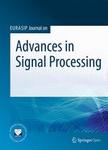版权所有:内蒙古大学图书馆 技术提供:维普资讯• 智图
内蒙古自治区呼和浩特市赛罕区大学西街235号 邮编: 010021

作者机构:Univ Guanajuato Dept Elect Engn Salamanca 36855 Mexico Cleveland State Univ Dept Elect & Comp Engn Cleveland OH 44115 USA
出 版 物:《EURASIP JOURNAL ON ADVANCES IN SIGNAL PROCESSING》 (EURASIP信号处理进展杂志)
年 卷 期:2013年第2013卷第1期
页 面:1页
核心收录:
学科分类:0808[工学-电气工程] 081203[工学-计算机应用技术] 08[工学] 0835[工学-软件工程] 0812[工学-计算机科学与技术(可授工学、理学学位)]
主 题:Unbiased FIR estimator Kalman filter Iterative algorithm Filtering Smoothing Prediction
摘 要:In this paper, we develop in part and review various iterative unbiased finite impulse response (UFIR) algorithms (both direct and twoaEurostage) for the filtering, smoothing, and prediction of timeaEurovarying and timeaEuroinvariant discrete stateaEurospace models in white Gaussian noise environments. The distinctive property of UFIR algorithms is that noise statistics are completely ignored. Instead, an optimal window size is required for optimal performance. We show that the optimal window size can be determined via measurements with no reference. UFIR algorithms are computationally more demanding than Kalman filters, but this extra computational effort can be alleviated with parallel computing, and the extra memory that is required is not a problem for modern computers. Under realaEuroworld operating conditions with uncertainties, nonaEuroGaussian noise, and unknown noise statistics, the UFIR estimator generally demonstrates better robustness than the Kalman filter, even with suboptimal window size. In applications requiring large window size, the UFIR estimator is also superior to the best previously known optimal FIR estimators.